Ford's Presidency of Healing
By Sean Kim
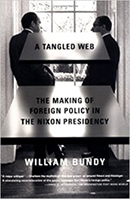
Yanek Mieczkowski
Yanek Mieczkowski, the author of Gerald Ford and the Challenges of the 1970s, is currently an Associate Professor of History at Dowling College. Mieczkowski received a Ph.D at Columbia University in 1995. Mieczkowski is also the author of The Routledge Historical Atlas of Presidential Elections and Instructor’s Manual for America in Modern Times.
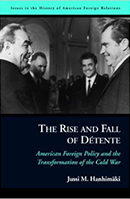


Yanek Mieczkowski’s Gerald Ford and the Challenges of the 1970s describes the unfortunate circumstances the Ford administration had to overcome in a nation hindered by a negative sentiment from the Nixon administration. Gerald Ford, as the thirty-eighth president of the United States, worked to rehabilitate the country in a leadership, economic, energy, and diplomatic and political sense, as stated in Mieczkowski’s book.
Mieczkowski begins his book by acknowledging the state of the nation subsequent to the stigma of the Nixon administration and more specifically, the Watergate scandal. As a leeway for the tone of the rest of the book, Mieczkowski thoroughly critiques Nixon and different aspects of his presidency. For example, Mieczkowski writes, “The Nixon presidency dragged the public’s trust in government down to a new low.”1 Moreover, Mieczkowski writes, “Watergate gouged the deepest wounds…The transcripts revealed the president as a man of mean moral character.”2 Such denunciations served to accentuate the difficulties Ford, as the president following Nixon, was obligated to overcome in order to heal the nation in a political attribute. Mieczkowski meticulously explained to readers that the public lacked confidence in the government after the Watergate scandal; this lack of confidence was epitomized by the low voter turnout in the 1974 elections, Ford’s initial unpopularity, and negative remarks from the press. To emphasize the arduousness of Ford’s presidency, Mieczkowski explains how Ford’s pardoning of Nixon tarnished his initial reputation. Mieczkowski writes, “The Nixon pardon was a defining event…A cynical Congress, public, and press viewed a politically courageous decision as an act of malfeasance.”3 The pardon of Nixon and the disfigurement it brought onto Ford would eventually impede on his promotion of policies later into his presidency; Mieczkowski also explains that Nixon’s pardon may have cost Ford a full presidential term. In addition to the defacement Nixon brought onto the image of presidency with the nation as a whole, Mieczkowski explains how the Nixon administration negatively impacted the relations between the White House and Congress: “[Nixon] poisoned the dialogue between the two branches with his secretive conduct of the Vietnam War, impoundment of budge money appropriated by Congress, and the abuses and mendacity of Watergate.”4 Just as Ford was impelled to heal relations with the public, Ford had to heal relations with Congress. Ford did so by hastening to Capitol Hill in order to address a joint session of Congress. At Capitol Hill, Ford addressed the concerns of both parties, the White House and Congress, and established his pledge that his administration would approach relations with Congress through communication, compromise, and cooperation. Ultimately in this onset of the book, Mieczkowski relates the actions Ford took to institute good correspondence with his overall vision for America. Mieczkowski states that Ford preferred action that proposed future benefits despite immediate consequences, actions of which included ensuring social security’s solvency and pardoning Nixon.
Not only does Mieczkowski write about the negative image of the presidency and Ford’s attempt to improve this image, but he also writes about the economic challenges of the 1970s and Ford’s approach to economic recovery. According to Mieczkowski, there existed a close link between the suspension of American confidence and the impending inflation of the decade. This lack of confidence in the American people was due to the Vietnam War and the Iranian hostage crisis; these two historically significant events gave the American people the impression that “a small nation could oppugn American hegemony.”5 Other factors that led to such a dispirited sentiment was America’s economy relative to the economies of other major powers; Japan, the Soviet Union, and Western Europe grew in industrial infrastructure while America’s was diminishing at a sufficient level. Mieczkowski transitions to incorporate the Ford administration by describing the belief Ford held regarding the cause of the inflation of the seventies. Ford was convinced that high federal spending was an extensive cause of the inflation; Mieczkowski utilizes Ford’s belief in the cause of the inflation as an outlet for analysis of presidential administrations prior to the Ford era. Mieczkowski elucidates that the Johnson administration had disregarded the long-term effects of the distribution of billions of dollars in the war against Vietnam and the war against domestic poverty; Johnson’s refusal of a tax increase as well as the competitiveness of the free market in the midst of shortages of critical materials ushered demand-pull inflation. Ford sought to relieve the inflation by trimming the federal budget and engaging the nation in a series of ambitious economic summit meetings; however, Mieczkowski further emphasizes the scarcity of belief in Ford and the abundance of criticism during this time. The critics of the summit claimed that its participants had a focus that deviated from the true problem, recession. Following the conferences on inflation, further attempts to alleviate the economic problems of the decade transpired, such as the Economic Policy Board (EPB). The Economic Policy Board, which allowed Ford to develop policy options and make the final decision, allowed Mieczkowski to further consider the improvements Ford brought to the idea of presidency (Ford had involved himself in economic policies while Nixon had left them to his advisors). Additional efforts to fight inflation came from Ford’s awareness that appeal to the public was an integral, if not the only, part to potential success. Earth Day 1970, which held environmental rallies and established clean up projects, and the “Whip Inflation Now” (WIN) program all encompassed the public.
Mieczkowski additionally describes the challenges Ford had to confront by writing on the topic of the energy crisis, the rise in prices in the supply of energy resources to the economy, during the seventies. Mieczkowski commences this topic by explaining the cause of the energy crisis—that Americans thought the Arab oil embargo caused the energy crisis, but in fact, the crisis manifested itself prior to its outbreak. Again, Mieczkowski accounts the difficulties of the decade as a consequence of a prior administration. Mieczkowski writes, “A convergence of factors caused [the energy crisis], including an unfortunate system of price controls that the Nixon administration imposed during the early 1970s.”6 In order to alleviate the energy crisis, Ford took many actions, instituting the Clean Air Act of 1965, which altered U.S. environmental regulation. Ford also announced a program to allocate crude oil and refinery products to independent marketers and refiners. This program, like many others, was subject to criticism—the Federal Energy Office received grievances regarding the insufficiency of voluntary allocation. In the duration of Ford in office, Ford was hindered from developing an energy program because of the absence of a comprehensive energy policy; Ford blamed this aspect on Congress, in which he stated “‘Even after the Arab oil embargo of 1973, Congress refused to believe that a crisis was at hand.’”7 (pg. 216). In his State of the Union address, Ford included energy proposals, the responses of which were generally negative. For example, utility and petrochemical executives, including the head of United airlines Edward Carlson, sent telegrams to the White House in protest that an oil import tax would damage their industries. Also, many economists questioned the timing of Ford’s proposals, conceding that the programs would decrease fuel use, depress economic output, and worsen the recession; however, by the end of his presidency, Ford’s energy programs were regarded as one of his more exceptional accomplishments.
Another challenge Ford faced as president was in the diplomatic, international field. For example, Ford sought to eliminate a neoisolationist sentiment and a resistance to détente that the American people held; according to a U.S. Information Agency survey, Western European perceptions of the U.S. declined partly due to the presence of isolationism domestically. To improve the United States’s foreign status, Ford dispatched a cabinet-level group to numerous foreign nations to discuss economic policies and other matters. Moreover, Ford was also burdened from a previously failed “Vietnamization” policy. Nguyen Van Thieu and North Vietnam had advanced to the South and captured a province, which prompted Ford to request $522 million in emergency aid for South Vietnam and Cambodia. After additional threats towards South Vietnam by the North, Ford, in his “State of the World” address, asked Congress for $722 million in emergency military aid: “‘If we got the money for the economic aid and the military aid, there was a chance the South Vietnamese were strong enough to negotiate a final settlement with the North Vietnamese.”8 The war itself was not the only problem. The conclusion of the war resulted in numerous South Vietnamese refugees. To deal with the refugee problem, Ford ordered a fund that flew in refugees into the United States, a fund which deemed extremely unpopular. Americans held racist values and concerns over job competition. This anti-refugee attitude angered Ford and induced him to campaign for the acceptance of Vietnamese refugees.
Mieczkowski, in his book, ultimately attempts to teach readers the different and defining aspects of Ford’s presidency and the legacy he left on this nation. Mieczkowski argues that Ford’s views on leadership, economy, and diplomacy were adaptive and optimal despite unsatisfactory circumstances. For example, Mieczkowski writes, “After Watergate, [Ford’s] moderate politics served a functional purpose, preventing the further polarization of an electorate that had grown anxious and divided.”9 Mieczkowski demonstrates his point by acknowledging Ford’s ability to right the tarnished image of presidency, dramatically reduce inflation, and solve the energy crisis through prudent policies.
Throughout the book, Mieczkowski maintains a one-sided perspective that favors Ford and disfavors Nixon. For example, Mieczkowski writes, “The treacherous political environment was one of the worst that any chief executive has ever faced. How Ford addressed these challenges furnishes a compelling story of presidential leadership.”10 Because Ford’s presidency embodies a period of public opinion, Mieczkowski assiduously addresses perspective into his book. Mieczkowski does so by continuously explaining that Ford was not a popular president during the era of the 70s, and because time has progressed, Mieczkowski writes that reevaluation is necessary. Mieczkowski, throughout the entirety of the book, retains the outlook that Ford was an exemplary president that pointed the nation in the right direction; Mieczkowski also believes that the primacy of Ford’s problems and challenges in office was due to the ineptitude of Nixon. Essentially, Mieczkowski’s book displays that general opinion, whether a historical or political one, may not be completely rational as the event itself is occurring due to the presence of biased influences and animated feelings.
Edward D. Berkowitz, in his review, seen in “The Business History Review,” of Mieczkowski’s book writes that Mieczkowski attempts to “portray Ford as a man of integrity and substance who actually ameliorated some of the era’s worst problems.”11 Mieczkowski deviates from the press’s view of Ford during his presidency and holds the opinion that Ford lived up to the challenges of the decade. Berkowitz also writes that the book was written at a primary, secondary, and tertiary level. At the primary level, Mieczkowski’s book is a political biography that describes the actions Ford takes as the president. At the secondary level, the book is a policy history of the 70s. At the tertiary level, the book addresses the challenges of the 70s beyond the context of presidency and politics. Berkowitz claims that these three implied levels of the book “do not mesh seamlessly,” but the book is comprehensive enough for the reader to acquire new knowledge and a new perspective regarding Gerald Ford.12 Berkowitz, moreover, realizes Mieczkowski’s somewhat exhausted writings of reputation over what may be more significant analytical topics. Nonetheless, Berkowitz views Mieczkowski’s book as a great political biography, more so than a public policy guide.
H. Roger Grant of Clemson University, in his review of Gerald Ford and the Challenges of the 1970s, acknowledges Mieczkowski’s “heavy emphasis on Ford’s responses to the economic and energy problems the country faced during the mid-1970s.”13 Grant’s stance on Mieczkowski’s book is altogether positive, stating that it allows the reader to more easily understand the intricacies of Ford’s presidencies regarding the nation’s domestic and international policies. Also, Grant writes that Mieczkowski’s book leads to the general consideration of utilizing information of Ford’s presidency in context of other subject matter, including religious right. Grant concludes by recommending Mieczkowski’s book to scholastic libraries and anyone with the desire to learn more about the critical decade of the seventies. Ultimately, Grant’s perspective regarding Mieczkowski deviates, to an extent, from Berkowitz’s perspective. Unlike Berkowitz’s review, Grant’s review is absent of any critique.
Mieczkowski’s Gerald Ford and the Challenges of the 1970s is a comprehensive, informative biography of Gerald Ford and the challenges he faced as president. Mieczkowski approaches this topic through a specific stance: one that encompasses the esteem and the character of the individuals discussed. The book is categorized and divided in such a way that allows for the subject matter to be more easily coherent and explicit—Mieczkowski divides the book into the four major challenges of the 1970s and how Ford dealt with these issues. Mieczkowski’s analysis of the different reputations of the characters of the book, however, yields an atmosphere of subtle bias. This partiality is present in statements such as, “Richard Nixon’s presidency bequeathed…issues to Ford in far worse condition than when Nixon took office.”14 Also, in his writings on policy, Mieczkowski incorporates a level of complexity, one that embodies complicated descriptions of policies, that will most likely not relate well with the reader. Despite the occasional text that lacks pertinence, the meticulously researched information of Mieczkowski’s book ushers readers’ newfound knowledge of and appreciation for Gerald Ford’s presidency.
Regarding the 70s as a whole, Mieczkowski holds the position that this decade was a time of crisis and in need of repair. Given the unrelenting circumstances of the era, Mieczkowski proposes that the nation could learn from the many challenges and more specifically, how Ford handled these challenges. Through his book, Mieczkowski also justifies that each presidency is a continuation of the previous one. For example, Mieczkowski states, “Americans might think that the energy crisis began with the Arab oil embargo. In reality, the problem manifested itself months, even years, before the embargo.”16 Thus, each president can sufficiently learn from the previous one. In this way, Mieczkowski implies that the 70s is, to a great extent, a continuation of the 60s.
Overall, Yanek Mieczkowski’s Gerald Ford and the Challenges of the 1970s regards the intricacies of Gerald Ford’s presidency and the problems he was obligated to face due to the ineptitude of previous leaders of the nation. The incompetency of Nixon, epitomized by the Watergate scandal, generated a negative sentiment among the people. Such circumstances induced Gerald Ford’s presidency to be one of healing.
Footnotes:
- Mieczkowski, Yanek. Gerald Ford and the Challenges of the 1970s. Lexington: The University Press of Kentucky, 2005. 20.
- Mieczkowski, Yanek. 20.
- Mieczkowski, Yanek. 37.
- Mieczkowski, Yanek. 56.
- Mieczkowski, Yanek. 97.
- Mieczkowski, Yanek. 198.
- Mieczkowski, Yanek. 216.
- Mieczkowski, Yanek. 291.
- Mieczkowski, Yanek. 91.
- Mieczkowski, Yanek. 3.
- Berkowitz, Edward D. Rev. of Gerald Ford and the Challenges of the 1970s. The Business History Review 79.3 (2005): 649-51. Print.
- Berkowitz, Edward D. Rev. of Gerald Ford and the Challenges of the 1970s. The Business History Review 79.3 (2005): 649-51. Print.
- Grant, H. Roger. Rev. of Gerald Ford and the Challenges of the 1970s. Michigan Historical Review 23.1 (2006): 137-38. Print.
- Mieczkowski, Yanek. Gerald Ford and the Challenges of the 1970s. Lexington: The University Press of Kentucky, 2005. 2.
- Mieczkowski, Yanek. 198.
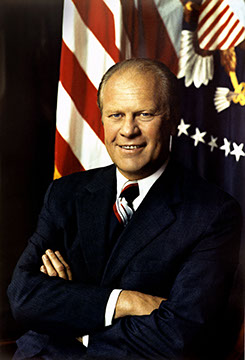

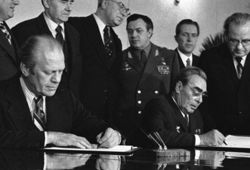
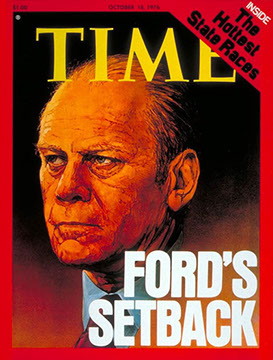
1 - 4
<
>